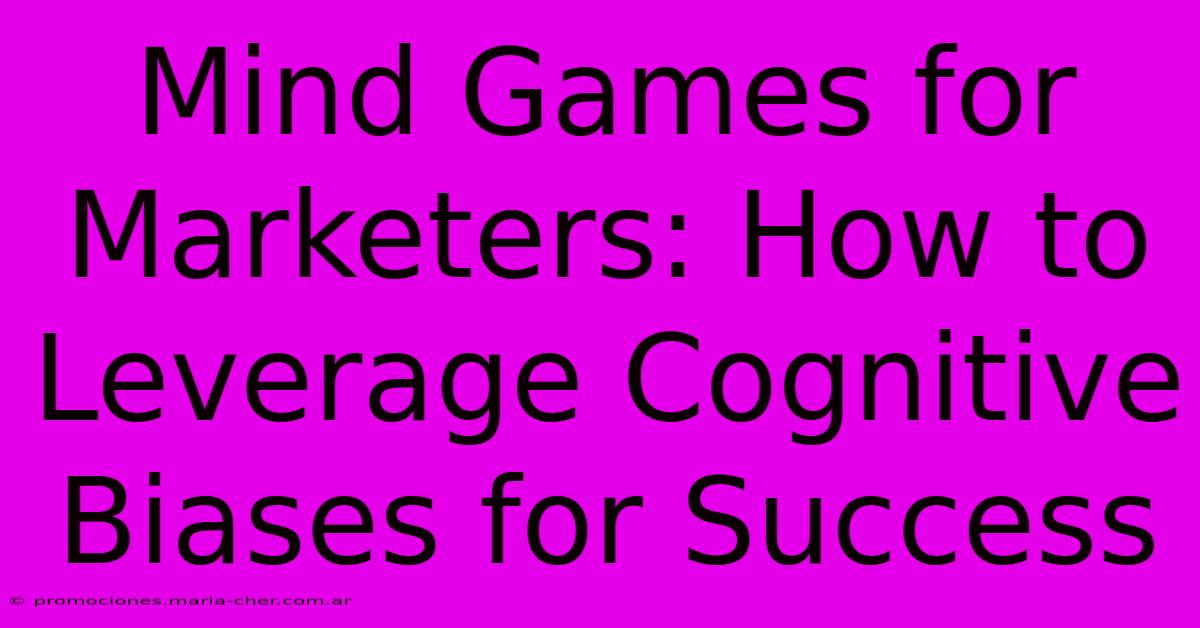Mind Games For Marketers: How To Leverage Cognitive Biases For Success

Table of Contents
Mind Games for Marketers: How to Leverage Cognitive Biases for Success
Marketing is a battle for attention. In a world saturated with messages, standing out requires more than just a catchy slogan. It demands a deep understanding of human psychology – specifically, cognitive biases. These mental shortcuts, while often leading to irrational decisions, are incredibly powerful tools for marketers who know how to wield them. This article explores how you can leverage cognitive biases to create more effective marketing campaigns and achieve significant success.
Understanding Cognitive Biases
Cognitive biases are systematic errors in thinking that affect our decisions and judgments. They're not flaws, but rather inherent aspects of how our brains process information efficiently. By understanding these biases, marketers can craft messages that resonate more deeply with their target audience, leading to increased engagement and conversions.
Key Cognitive Biases to Leverage:
-
Anchoring Bias: This bias refers to our tendency to rely too heavily on the first piece of information we receive (the "anchor") when making decisions. Example: Offering a high-priced item first, then presenting a lower-priced option as a more reasonable alternative (making the lower price seem like a better deal).
-
Availability Heuristic: We tend to overestimate the likelihood of events that are easily recalled, often due to their vividness or recent occurrence. Example: Using strong visuals and compelling storytelling in your marketing materials to make your brand more memorable and increase perceived likelihood of positive outcomes.
-
Bandwagon Effect: People are more likely to adopt a belief or behavior if they see others doing it. Example: Showcasing social proof, such as customer testimonials, reviews, and high follower counts, to influence potential customers.
-
Loss Aversion: People are more motivated to avoid losses than to acquire gains. Example: Highlighting what customers stand to lose by not choosing your product or service, such as missed opportunities or potential financial setbacks.
-
Framing Effect: The way information is presented can significantly impact how people perceive it. Example: Focusing on the benefits of a product rather than its drawbacks, or framing a price increase as an investment rather than a cost.
Practical Applications for Marketers
Understanding these biases is only half the battle. The real challenge lies in applying this knowledge strategically within your marketing efforts.
Crafting Compelling Campaigns:
-
Pricing Strategies: Use anchoring bias to your advantage by strategically positioning prices. Offering a premium option alongside a more affordable one can make the latter seem like a better value.
-
Content Marketing: Leverage the availability heuristic by creating memorable and emotionally resonant content that's easily recalled. Focus on storytelling and strong visuals.
-
Social Proof: Use the bandwagon effect to your advantage by prominently displaying social proof such as testimonials, reviews, and user-generated content.
-
Limited-Time Offers: Capitalize on loss aversion by creating a sense of urgency with limited-time offers and scarcity tactics.
-
Positive Messaging: Employ the framing effect by focusing on the positive aspects of your product and highlighting its benefits.
Ethical Considerations
While leveraging cognitive biases can significantly improve your marketing results, it's crucial to do so ethically. Avoid manipulative tactics that mislead or deceive consumers. Transparency and honesty are paramount. Using these techniques to subtly influence decision-making is acceptable, but outright manipulation is unethical and potentially harmful to your brand's reputation.
Conclusion:
Mastering the art of leveraging cognitive biases is a game-changer for marketers. By understanding how these mental shortcuts influence consumer behavior, you can craft more effective campaigns that resonate on a deeper level. Remember to use these techniques responsibly and ethically, focusing on building trust and fostering long-term customer relationships. The key is to create marketing that is both persuasive and respectful. By understanding the psychology behind consumer decisions, you can unlock significant success in today's competitive marketplace.

Thank you for visiting our website wich cover about Mind Games For Marketers: How To Leverage Cognitive Biases For Success. We hope the information provided has been useful to you. Feel free to contact us if you have any questions or need further assistance. See you next time and dont miss to bookmark.
Featured Posts
-
The Ultimate Guide To Wholesale Flower Prices Save A Fortune
Feb 08, 2025
-
Transform Your Home Into A Floral Oasis Budget Friendly Dried Flower Deals You Cant Resist
Feb 08, 2025
-
Elevate Your Wedding Aesthetic With Artfully Arranged Pre Made Bouquets
Feb 08, 2025
-
Floral Splendor Dive Into An Ocean Of Babys Breath For Unforgettable Moments
Feb 08, 2025
-
Fairy Dust For Your Home Bulk Babys Breath The Instant Decor Miracle
Feb 08, 2025
